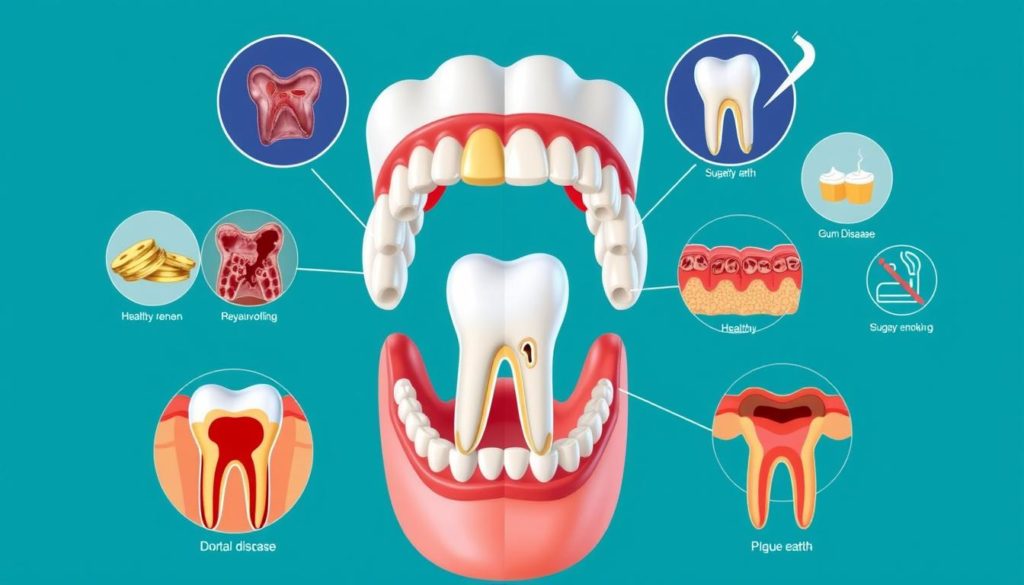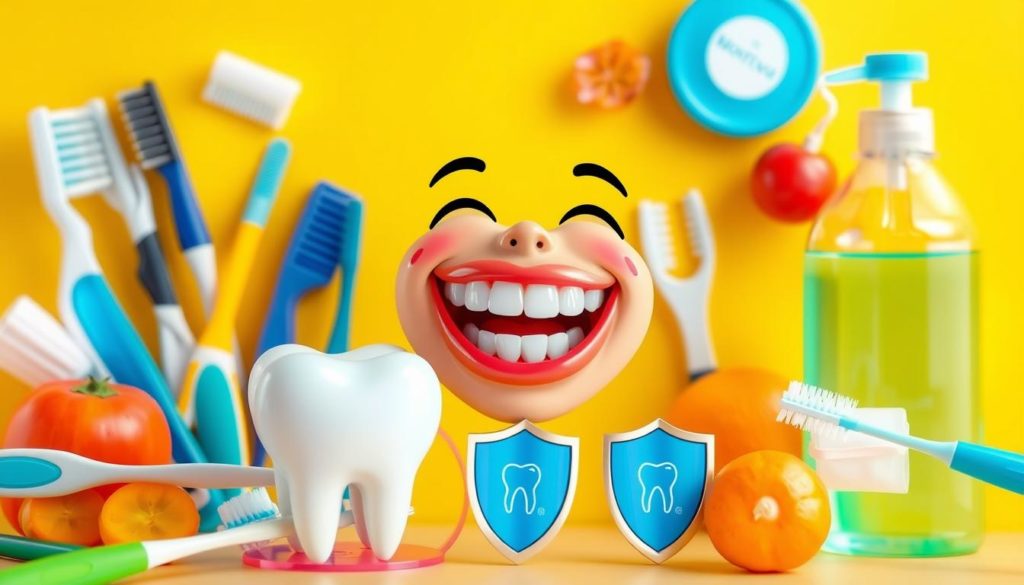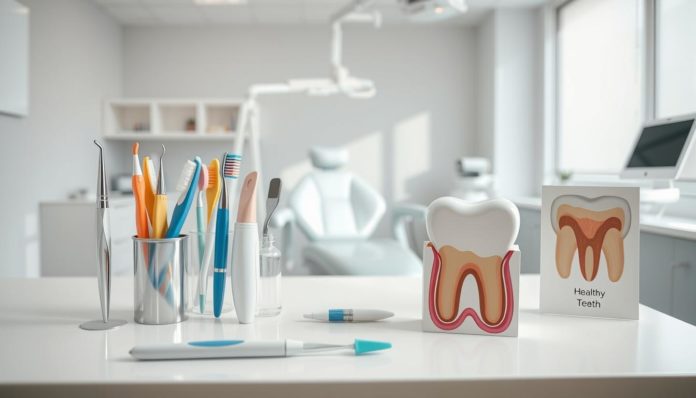Did you know nearly 178 million people in the U.S. are missing at least one tooth? And shockingly, 40 million have no teeth at all. This fact highlights how crucial Tooth Loss Prevention and Dental Care are. Good dental health keeps your smile bright. It also affects your nutrition, how you feel about yourself, and how you connect with others.
Aging and genetics do affect our dental health. But, there are many things within our control. Keeping up with daily tooth care, avoiding smoking, and taking care of our overall health help keep our teeth. A study by Khalaf Al-Shammari and team lists smoking, diabetes, poor dental hygiene, not seeing a dentist, and ongoing health issues as main risks for losing teeth.
Mixing daily dental care with regular dentist visits can make a big difference. This helps prevent tooth loss and keeps your mouth healthy.
Introduction to Tooth Loss Risk Factors
Knowing what increases tooth loss risk is key for healthy teeth. Main Oral Health Risks include not keeping your mouth clean, smoking, not managing diabetes, and skipping dentist visits.

Khalaf Al-Shammari’s study in Kuwait shows how big an impact these factors have. It especially focuses on how Causes of Tooth Loss affect our dental health. His findings tell us that men over 35 who smoke or ignore dental care are more at risk.
To avoid Periodontal Disease and watch out for things like Dental Cavities, it’s important. Here’s a summary of major risks and how they lead to losing teeth:
| Risk Factor | Impact on Tooth Loss |
|---|---|
| Poor Oral Hygiene | Leads to Dental Cavities and Periodontal Disease |
| Smoking | Increases Oral Health Risks and Causes of Tooth Loss |
| Unmanaged Diabetes | Contributes to Periodontal Disease |
| Lack of Professional Dental Care | Increased likelihood of Dental Cavities and other oral health issues |
By changing what you can control, you help your mouth stay healthier. This means you also avoid the downsides of losing your teeth.
Importance of Dental Health in Preventing Tooth Loss

Dental health is crucial for many reasons, mainly in avoiding tooth loss. Having strong, healthy teeth lets us enjoy varied foods and speak clearly. Oral hygiene importance is significant because it prevents chronic conditions like diabetes, heart disease, and rheumatoid arthritis. These diseases can increase the risk of losing teeth. So, it’s vital to keep up with excellent oral care.
Follow these steps to preserve natural teeth:
- Brush your teeth at least twice a day with fluoride toothpaste.
- Floss daily to get rid of plaque and bits of food between your teeth.
- Go to your dentist often for cleanings and check-ups.
- Cut down on sugary drinks and snacks to avoid cavities and prevent tooth decay.
- Use a mouthguard during sports to protect your teeth from getting hurt.
To manage your oral health and keep your teeth, follow these guidelines. Adding good dental care habits to your daily life is key. It ensures you keep a healthy smile forever.
Poor Oral Hygiene and Its Effects
Poor dental hygiene can cause a lot of oral health issues. These problems can lead to severe outcomes like tooth loss. It’s important to brush and floss regularly to keep your mouth healthy. Sadly, many people skip these steps, which leads to major problems.
Consequences of Not Brushing and Flossing
Not brushing and flossing can damage your oral health. Plaque buildup is one of the first problems. It’s a sticky film that grows bacteria and uses the sugars we eat. If we don’t remove it, plaque becomes tartar, which needs tartar removal.
The bad effects of not caring for your teeth include gum swelling, or gingivitis. If not treated, it can become advanced periodontal disease. Daily brushing and flossing can prevent these issues.
Role of Professional Dental Care
Even though taking care of your teeth at home is key, professional dental checkups are crucial. Dentists do special cleanings to manage plaque buildup. These cleanings help in tartar removal, which you can’t do alone at home.
Professional dental care also helps spot early signs of oral health problems. Treatments like fluoride and dental sealants during a dental checkup can protect your teeth. They help avoid decay and other issues.
| Indicator | At-Home Care | Professional Care |
|---|---|---|
| Plaque Buildup | Controlled with regular brushing and flossing | Complete tartar removal through dental cleanings |
| Gum Health | Prevented with consistent hygiene practices | Assessment and treatment for gingivitis and periodontal disease |
| Tooth Decay | Reduced by fluoride toothpaste use | Minimized with professional fluoride treatments and sealants |
To sum it up, taking care of your teeth every day and seeing a dentist regularly are key. Together, they fight the effects of poor dental hygiene. They keep your mouth healthy and can stop serious problems like tooth loss.
Understanding Periodontal Disease
Periodontal disease is a serious gum disease that can harm your dental health. It starts with plaque buildup and can turn into gingivitis. If not treated, it can lead to periodontitis, causing dental bone loss.
Many don’t notice early symptoms like infection in gums. That’s why going to the dentist regularly is crucial. It helps catch symptoms early, stopping the disease from getting worse.
Knowing about periodontitis and getting help early are important to avoid serious problems. This includes tooth loss and dental bone loss. Keeping an eye on gum disease is vital for healthy teeth.
| Stage | Symptoms | Possible Consequences |
|---|---|---|
| Gingivitis | Red, swollen gums | Initial stage of gum disease |
| Periodontitis | Persistent bad breath, loosening teeth | Infection in gums leading to dental bone loss |
| Advanced Periodontitis | Severe tooth pain, significant bone loss | Potential tooth loss and lifelong condition |
Impact of Smoking on Dental Health
Tobacco and oral health are deeply connected. Their effects go beyond just stained teeth. Smoking releases many toxic substances that harm your teeth. These can lead to serious problems like periodontal disease and oral cancer.
How Tobacco Affects Your Teeth
Smoking speeds up damage to your gums and bones around your teeth. Nicotine and tar irritate your mouth’s tissues. They cause dry mouth and slow down healing. These chemicals also bump up your risk of getting mouth cancer.
Quitting Smoking for Better Oral Health
Stopping smoking greatly benefits your mouth’s health. People who quit often see healthier gums and a lower risk of mouth cancer. They also enjoy better oral hygiene. Quitting smoking is a big step towards better health overall.
Genetics and Age as Risk Factors
Some causes of tooth loss, like genetics and age, are out of our hands. Genetics strongly influence Our Dental Health, affecting our teeth and gum’s well-being. For example, a family history of weak enamel may lead to more cavities and gum disease.
As we age, taking care of our teeth becomes even more important. Older age can wear down enamel, leaving teeth open to cavities. The chance of getting gum disease also grows because our gums change, we have less saliva, and other reasons.
Starting oral care early in life can lessen some inherited dental issues. Having regular dental visits and good teeth cleaning habits early on set the stage for better oral health later.
To fight off both genetics and aging problems, sticking to good dental habits and getting professional help is key. Consider:
- Brushing and flossing every day to keep plaque away and avoid gum disease.
- Going to the dentist often for cleanings and check-ups.
- Talking to your dentist about your family’s dental history to get a custom care plan.
Poor Nutrition and Tooth Loss
Nutrition is key to keeping your teeth healthy. Eating too much sugar and carbs can harm your teeth. It’s important to know how effects of sugar on teeth can impact your diet.
The British Regional Heart Study shows a link between what we eat and our dental health. Bad diets can harm our teeth.
To prevent tooth loss, eat foods that are good for your teeth. Calcium and potassium are important for strong teeth. Not getting enough can cause nutrient deficiency and oral health problems. Poor eating habits have been connected to tooth loss and gum disease.
To lessen the effects of sugar on teeth, cut down on sweets. Eating foods full of nutrients helps protect against tooth decay. Here’s a detailed study for more information on diet and dental health.
To sum up, bad eating habits can lead to dental issues. A dental health diet boosts not just your dental, but overall health too.
Role of Diabetes in Tooth Loss
Diabetes can seriously affect your mouth health, making you more at risk for dental issues. High blood sugar can cause more chances of getting gum disease, which can lead to losing teeth. Knowing how diabetes and mouth health are connected is key for both patients and doctors.
How Diabetes Affects Oral Health
Diabetes makes people more likely to get gum disease. High sugar levels create a good place for bacteria to grow. This can lead to infections in gums and the bones that keep teeth in place. Also, diabetes can make less blood go to the gums, making the problem worse. This can cause serious gum disease and loss of teeth. It shows why keeping sugar levels under control is necessary for healthy teeth.
Managing Diabetes to Prevent Tooth Loss
Managing diabetes is critical for keeping your mouth healthy. Checking and keeping sugar levels in check can stop gum disease in people with diabetes. Also, good habits like brushing and flossing are extra important. Diabetics should talk often with their dentist to get the right dental care plan. By managing diabetes well, you can lower the chance of losing teeth. This highlights how key managing diabetes is for mouth health.
FAQ
What are the main risk factors for tooth loss?
The key risk factors include not taking care of your teeth, smoking, and not managing diabetes. Not seeing a dentist regularly, eating poorly, and having gum diseases are also risks.
How can I prevent tooth loss?
Keep your teeth clean by using toothpaste with fluoride and flossing. Also, see your dentist for check-ups. Not smoking and controlling chronic diseases like diabetes is important too.
Why is smoking linked to tooth loss?
Smoking causes gum disease and mouth cancers, which can lead to losing teeth. The nicotine and tar make oral tissues irritated, dry out your mouth, and stain your teeth, which worsens dental issues.
How does diabetes affect my oral health?
If you have diabetes, you’re at a higher risk of gum disease and tooth loss. This is due to more bleeding in the gums and a better environment for bacteria. Managing diabetes with good dental care matters a lot.
Are poor oral hygiene habits really that harmful?
Yes, not taking care of your teeth leads to plaque, cavities, and serious gum disease. Brushing, flossing, and dentist visits are important to fight these problems.
Can professional dental care make a difference?
Absolutely. Dentists can spot early signs of problems and offer treatments, like sealants and fluoride. They also clean your teeth to get rid of plaque and tartar that brushing at home can’t remove.
How does age impact my risk of tooth loss?
As you get older, your enamel wears down, and gum disease is more likely, making tooth loss more common. Keeping good oral habits and seeing your dentist often helps lower these risks as you age.
What role does nutrition play in maintaining dental health?
Eating foods with lots of calcium and potassium keeps your teeth and gums strong. On the other hand, too much sugar and carbs feed harmful oral bacteria, causing cavities and leading to tooth loss.
How do genetics influence my risk for tooth loss?
Some people are more prone to gum disease due to their genes, which ups their risk of tooth loss. Even so, good oral care and professional check-ups can help manage this risk.
Is it possible to prevent periodontal disease?
Yes, preventing gum disease is possible with regular dentist visits, good oral hygiene, and professional cleanings. Catching and treating it early is key to stopping it from getting worse and causing tooth loss.


